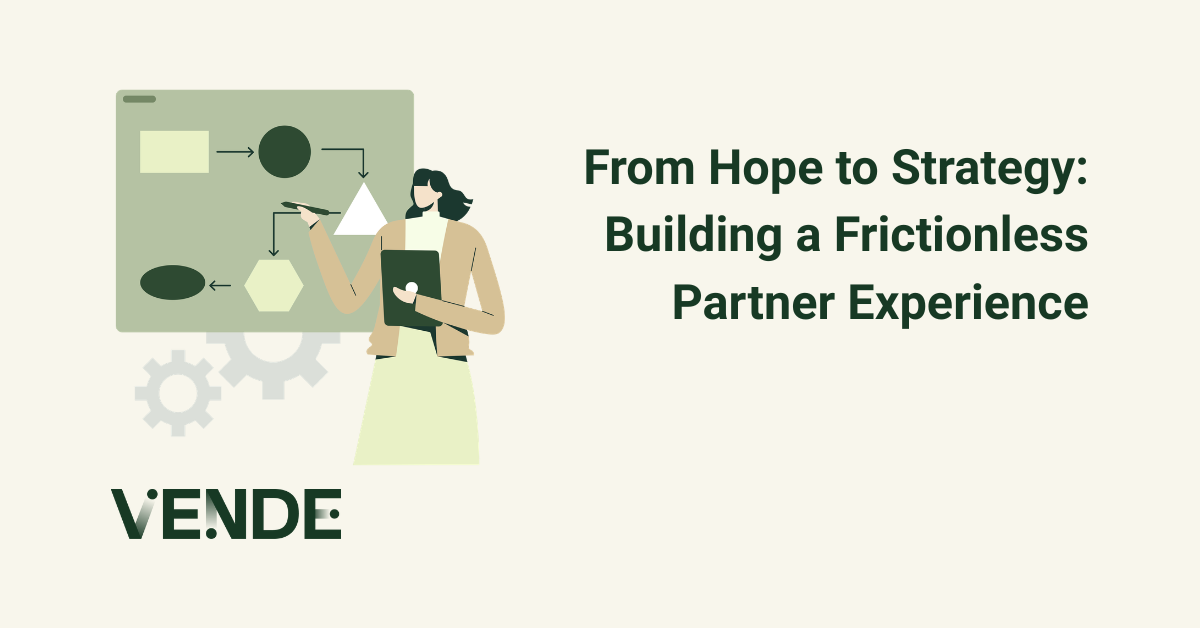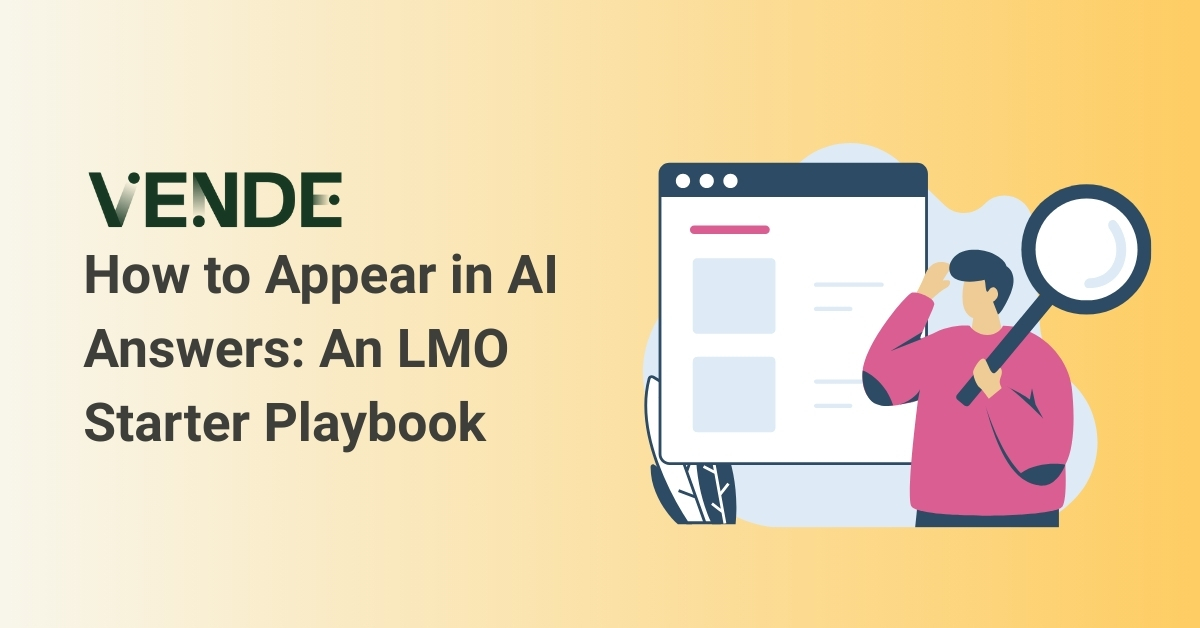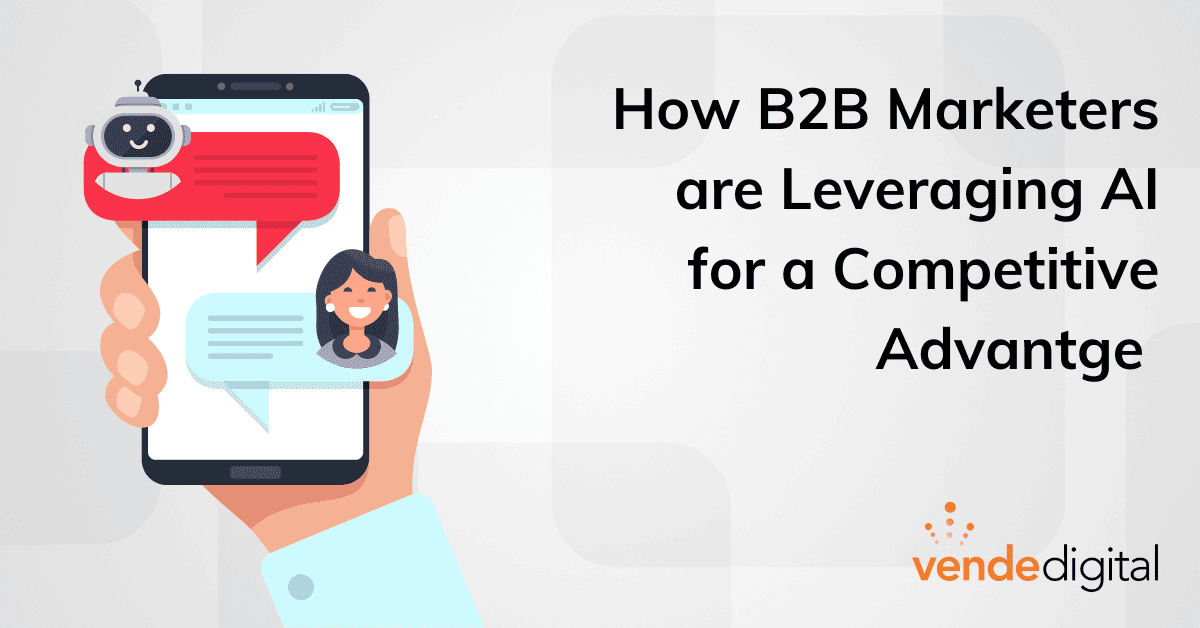
The Future is Here: How B2B Marketers are Leveraging AI for a Competitive Advantage
Artificial Intelligence (AI) isn’t going away anytime soon. AI is reshaping B2B marketing and creating game-changing opportunities for businesses. In this Blog, we'll explore the rapid evolution of AI technology, where it’s going, and the best ways to leverage it to gain a competitive edge and keep from falling behind.
How is AI Being Used in B2B Marketing?
AI is revolutionizing B2B marketing by shorting the time to create marketing assets, enabling hyper-personalization, automating repetitive tasks, and providing data-driven insights. B2B marketers leverage AI-powered tools for lead scoring, content generation, predictive analytics, and chatbots to enhance customer experiences, optimize marketing efforts, and achieve better results.
Robots Are Taking Over. Is My Job at Stake?
It could be. But that’s entirely up to you. I remember when the Internet showed up, and then search engines and next was social media. B2B marketers were scared then too. But guess what? These previous disruptions didn't replace the need for human marketers and copywriters. It created opportunities for B2B marketers to leverage new capabilities and enhance their Go-to-Market strategy. Smart marketers will view AI as a tool to unlock new possibilities for getting work done faster and engaging customers rather than as their replacement.

AI will undoubtedly change how we work, but marketers must stay creative, innovative, and, well…human. We can let AI handle the commodity of execution, freeing up more time for the human ideation and creativity behind the tasks. For example, ChatGPT for B2B marketing can assist in writing blog posts, but it's still up to us to come up with ideas and concepts that evoke emotions in our audience. At best, AI can get you 80% there, but humans need to get the work across the finish line.
AI will not replace B2B marketers, but marketers who know how to use AI tools will replace those who don't.
Here’s what Gary Vaynerchuck had to say about AI in a recent post. “We are in control … AI will create efficacy and thus render some jobs less valuable … that’s been the story of man … and I believe in “us” and we will adjust and find new opportunities. Like we always do! ❣️❣️❣️💛 don’t be scared of it … understand it and use it.”
Concerns and Limitations of AI in Marketing
While AI offers significant benefits to B2B markers, you must know its limitations. We would not advise you to use AI tools, like ChatGPT for B2B marketing, that creates content or interact with the public without having a human review and approve the output and responses. Here are the most significant ones:
- Outdated information: ChatGPT has a knowledge cutoff in 2021, which means it may not have the most up-to-date information on current events or rapidly changing industries. Since many AI tools on the market are built on top of ChatGPT, this can result in incorrect responses.
- False information: While ChatGPT is trained on huge amounts of data, it may not always generate accurate or reliable responses. Verifying information from trusted sources is essential to avoid spreading misinformation or making decisions based on potentially erroneous data.
- Data Privacy: Data privacy issues evolve around how personal data is collected, used, and shared by AI systems, including matters related to data collection practices, data usage, and data sharing.
- Content Spam: Content generated 100% using AI tools will not rank well in Google search results. Google is actively combatting AI-generated content in its recent Helpful Content Update. While Google doesn't discourage using AI tools, it advises against relying solely on AI for writing entire blogs. It's also important to exercise caution when working with content agencies, as some may overuse AI to produce content that won’t rank well for this reason. Be sure to ask the agency how they use AI in their content production process.
12 Ways B2B Marketers Can Use AI to Their Advantage
Let’s explore 12 ways you can leverage AI to enhance important aspects of your marketing strategies and drive better results.
1. Audience & Persona Development: Understanding your audience is key to creating content that connects with them. AI-powered Natural Language Processing (NLP) models (i.e. ChatGPT, Jasper, Copy.ai) can analyze language to uncover insights into your audience's preferences and needs at different stages of their buying journey. This helps you craft engaging content that resonates with them.
AI can also assist in building and refining personas for your content marketing. By simply using a prompt like “create an audience profile for [YOUR ICP] that would be interested in my [YOUR SOLTION],” you can gather insights that will enable you to create better content for your audience.
2. Content Optimization: AI can be used to optimize your blog or web content for search engines and user experience. By analyzing data and patterns, AI-powered tools can suggest changes to your content to make it more SEO-friendly. For example, you can use AI to analyze your content and provide suggestions for improving readability, tone, and relevance. You can ask NLP to write SEO-optimized title and description tags and pick keywords.
3. Translation: AI-powered language translation tools can save time and resources by automatically translating content into different languages. This can be especially useful for businesses with global reach or for creating localized content for other regions. You can use AI to repurpose your content and reach a broader audience in multiple languages, which can help you expand your market and increase your brand visibility.
4. Audio Content Generation: With changing buyer behavior and the increasing popularity of audio content, you can use AI to generate audio versions of your written content. For example, you can use AI to convert your blogs or articles into audio files, which can be listened to by your audience instead of read. We’ve tested MurfStudio and have been pleased with the results. This can help you cater to the different preferences and accessibility needs of your audience and also improve your search results for voice-activated devices and smart speakers.
5. Social Media Content: AI can help create engaging content demonstrating your industry expertise and thought leadership. AI tools can repurpose content like blogs, white papers, and case studies into helpful, channel-appropriate content. Be sure to include in your prompts what channel you are building the post for. You can even ask it to provide a headline hook and emojis. You can also use AI to craft thoughtful comments on others’ posts.
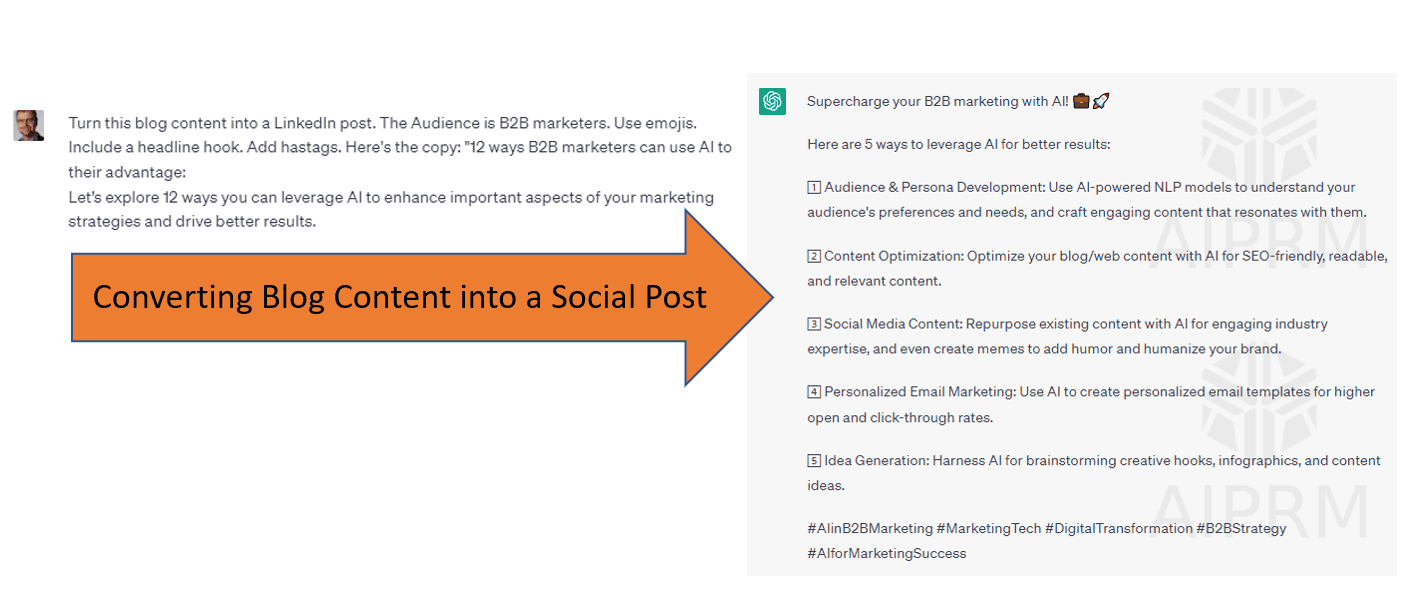
6. Memes for Marketing: Memes are an important part of social media content today. They can make your content stand out by adding humor to otherwise dry or dull content. Memes can also humanize your brand and foster community. If you aren’t funny or were born before memes became a thing (like me), AI can help. You can have AI create memes to go along with your social media content.
7. Brainstorming and Idea Generation: AI-powered NLP models can be used to brainstorm and generate new ideas. By inputting prompts or questions, you can use AI to generate creative suggestions or insights that inspire your content creation process. This can be especially helpful when looking for fresh ideas to create engaging and unique content.
8. Refreshing Old Blog Articles: For blog articles that need a refresh, you can use AI tools to rewrite them with some tweaks. This can help you create new blogs on similar topics and improve your content marketing efforts. Simply upload a blog that’s not performing well or is outdated and ask AI to rewrite it. You can even have it rewrite a pillar piece of content for a particular industry or persona.
9. Checking and Editing Existing Content: Another way to leverage AI is to use it to check and edit your existing content. AI tools can help you identify competitors listed in your content, remove irrelevant references, and ensure that your content aligns with your brand voice.
10. Writing Outlines for Blogs: AI can also generate outlines for blog articles. This can save you time and effort in creating blog content by providing a structure to follow.
11. Personalize Email Marketing Campaigns: Email marketing is still a highly effective B2B marketing tactic, but personalization is key to success. ChatGPT for B2B marketing can help you create personalized email templates for your email marketing campaigns. You can input prompts like, “Write an email introducing our new product to our existing customers” or “Create a follow-up email for our recent webinar attendees.” ChatGPT for B2B marketing can generate personalized email content that resonates with your audience and increases open and click-through rates.
12. Brainstorming Hooks and Creative Ideas: AI can be a valuable tool in generating creative ideas for hooks, infographics, and other content elements. By providing samples or directions, you can use AI to develop unique and engaging content ideas.
Let’s Master AI in Marketing Together
Be cautious of self-proclaimed "AI Gurus" and "ChatGPT experts" popping up everywhere. Mastering AI for B2B marketing requires hands-on experience and experimentation.
That's why it should be a team effort, and we've developed the Ultimate Guide for AI in Marketing as a free resource for B2B marketers. This guide is a collaboration of learning from a community of B2B marketers, including video tutorials about ChatGPT for B2B marketing.
In it, you’ll find insights on features, prompts, and integrations proven to save time and enhance the customer experience. We're all busy and don't have time for trial and error, so this resource will help us all level up our marketing game together. We plan to update this guide with new insights, tips, and tricks shared by the community. Be sure to check it out often as well as watch our Demand Gen Jam Session replay on tips for leveraging AI in B2B marketing.
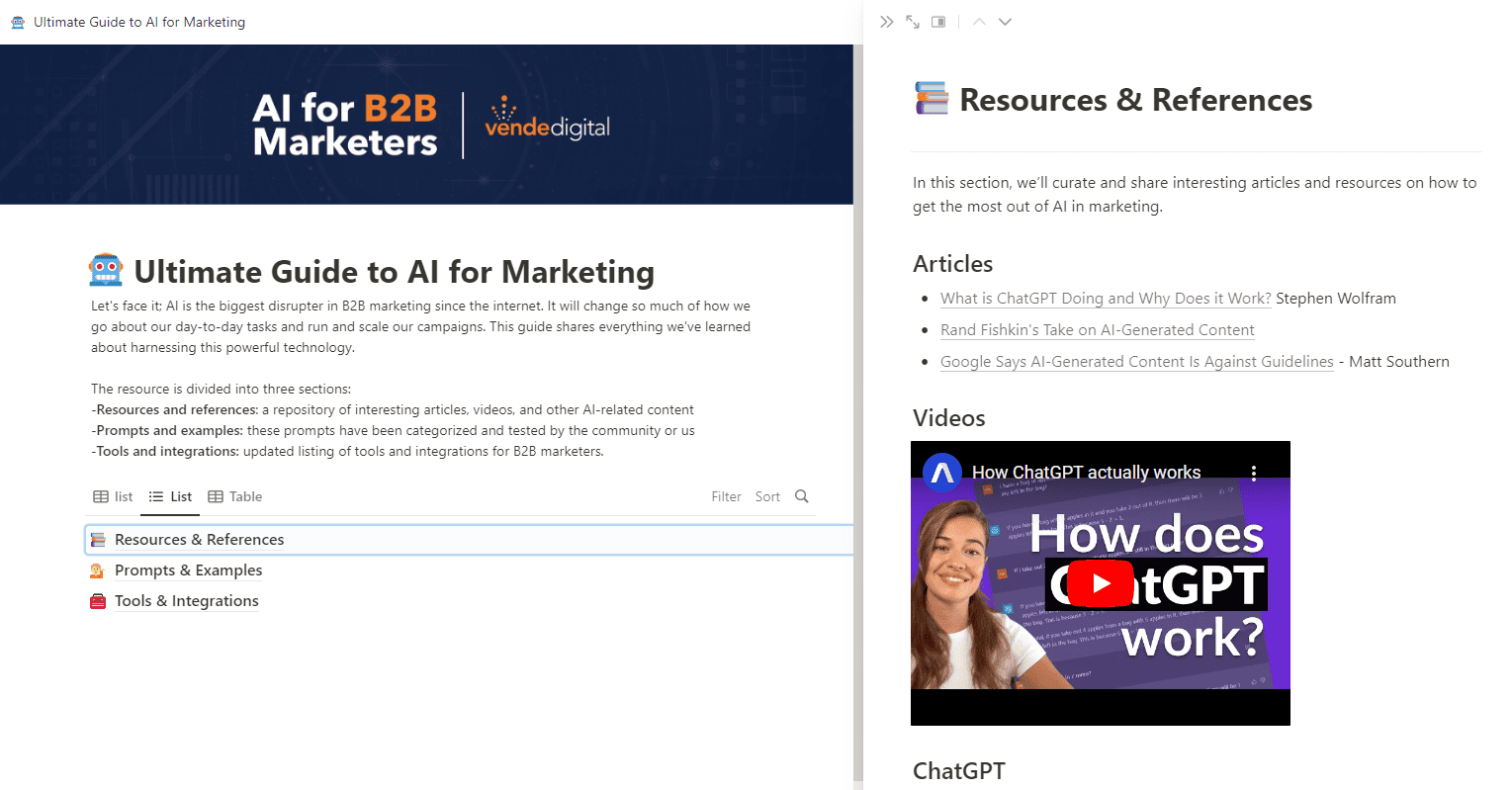
AI is undoubtedly here to stay, and embracing it can significantly boost your productivity while freeing time for more creative pursuits. Say goodbye to tedious labor-intensive tasks and time-consuming research, and hello to working smarter, not harder, with the power of AI at your fingertips.
The Ultimate Guide to AI in Marketing can help you become an AI master. Give the tips, prompts, tools, and integrations a try, and then share what's working for you with the community. We'd love to include your findings in a future update! So, let's join forces and unlock the full potential of AI in marketing together.
Key Takeaways for Leveraging AI in B2B Marketing
B2B marketers are only beginning to tap into the potential of AI. However, that’s changing quickly. It's up to you to decide whether to embrace or ignore this disruptive innovation. Savvy marketers will find ways to adapt and harness its power for their benefit and competitive advantage.
- AI is revolutionizing B2B marketing by enabling hyper-personalization, automating repetitive tasks, and providing data-driven insights.
- Marketers leverage AI-powered tools, like ChatGPT for B2B marketing, for lead scoring, content generation, predictive analytics, and chatbots to enhance customer experiences, optimize marketing efforts, and achieve better results.
- AI will not replace marketers, but marketers who know how to use AI tools will replace others who don't.
- You should be aware of the limitations of AI, such as outdated information, false information, and data privacy concerns.
- B2B marketers should collaborate and share their experiences so everyone can stay current on what’s working.
How Can We Help?
The world is changing fast, and being agile is critical to stay competitive. At Vende Digital, we help B2B organizations like yours develop B2B marketing strategies to win in the digital-first world.
Tired of struggling on your own?
Schedule a complimentary strategy call with our team to learn how we can help you accelerate your growth and leverage the latest trend to your advantage.

